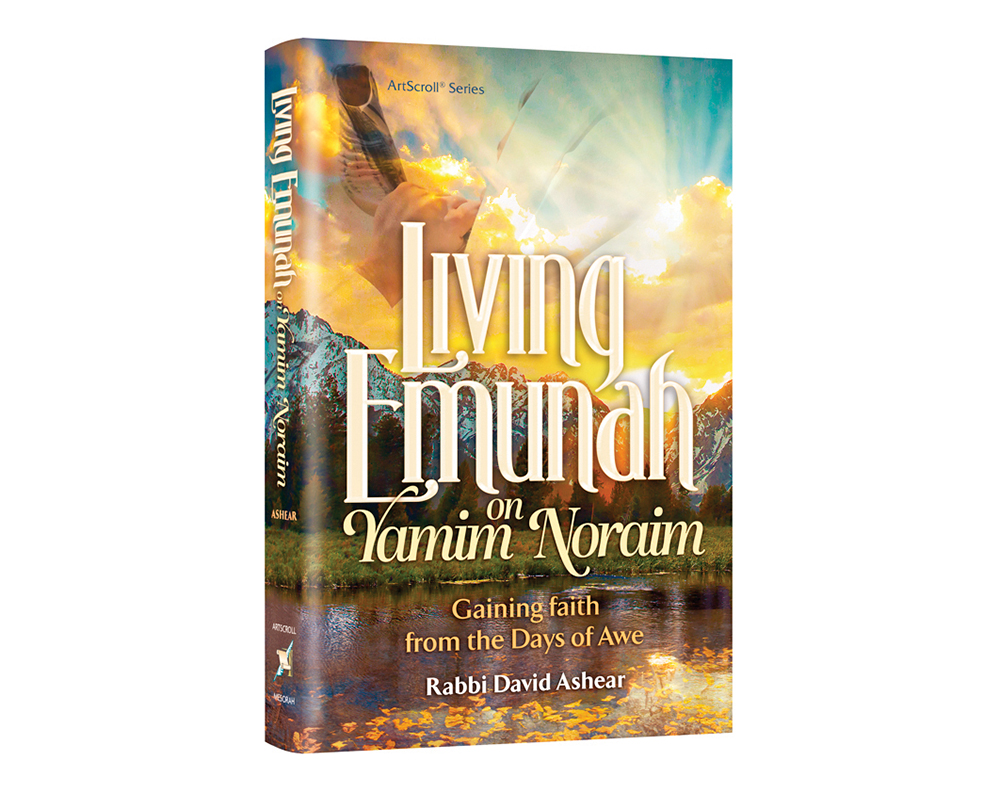Highlighting: “Living Emunah on Yomim Noraim” by Rabbi David Ashear. Mesorah Publications Ltd. 2024. Hardcover. 352 pages. ISBN-13: 978-1422642139.

(Courtesy of Artscroll) The month of Elul is a time of introspection, a time to think about what we might be doing wrong and accept upon ourselves to improve. Rabbi Moshe Alexandrov said he used to see his rabbi, the Chafetz Chaim, weeping during Elul. On one occasion, before Selichos, he heard the rabbi rebuking himself. “Yisrael Meir,” he cried, “did you thank Hashem enough for giving you the seichel (intellect) to write your book, Sefer Chafetz Chaim? Did you thank Hashem enough that people are learning from it?” And his list continued.
It is incumbent upon us all to recognize and thank Hashem for all He gives us. Thanking is not reserved for when Hashem miraculously saves us from some big problem or when He brings a yeshuah (salvation) for a long-standing issue. Thanking is something we are supposed to do every day, for the regular, everyday blessings Hashem gives us.
In a certain shul in Eretz Yisrael, whoever sponsored the kiddush on Shabbos morning also spoke during the seudah.
One week, the speaker got up and said, “I’m donating the kiddush today to thank Hashem for the refuah sheleimah He gave me for the sickness I had.”
The next Shabbos, the speaker declared that he was thanking Hashem because he was in a horrific car accident and walked away without a scratch.
The week after that, the sponsor said there was a fire in his house. Baruch Hashem, he got everyone out in time and wants to publicly thank Hashem for that.
For the next few weeks, every speaker told a similar story of salvation.
One week, as the sponsor rose from his seat to speak, everyone waited with bated breath to hear what he had gone through. He said, “I’ve been listening to all the speeches this year, and I’m very inspired. I don’t have any miracle to tell you about. I was not saved from any difficult circumstance. I am sponsoring the kiddush today to thank Hashem that I did NOT endure an illness, I was NOT in a car accident, my house did NOT catch fire. Baruch Hashem, everything is running smoothly.”
We don’t have to wait to be saved to thank Hashem. We can thank Hashem for all the potential harm from which He spared us.
Thanking Hashem should be part of our daily routine. The first berachah we say in the morning in the Birchos HaShachar is Hanosen lasechvi vinah l’havchin bein yom u’vein loylah. Simply explained, we’re thanking Hashem for giving the rooster the ability to discern the difference between day and night. The sefer Chai B’Todah asked: Should this really be the first berachah we make to thank Hashem? Hashem gives us so many blessings that we’re about to thank Him for: our eyesight, our strength, the ability to move around. Why do we start off thanking Him for the wisdom He gave the rooster?
He quotes the Alter from Slabodka who explained, based on the Gemara (Berachos 59b) that asked: What blessing should we recite to thank Hashem for rain? Rav Yehudah answered: מוֹדִים אֲנַחְנוּ לָךְ עַל כָּל טִפָּה וְטִפָּה שֶׁהוֹרַדְתָּ לָנו, Thank You, Hashem, for each and every drop [of rain] You provided for us. Rain gives us so many benefits. It waters the fields, causes crops to grow, quenches our thirst. The rabbi could have included in that blessing something about those benefits, but instead, he talked about thanking Hashem for each drop of rain individually. One droplet of rain does not give much benefit. Nevertheless, Rav Yehudah is teaching us that the way we are supposed to thank Hashem is to take notice of every little detail, to say, “Thank You, Hashem, even for that.”
Wisdom is the greatest gift given to mankind. It is what enables us to do everything we do in life. The first droplet of wisdom, so to speak, says the rabbi, is the wisdom given to the rooster. It is the smallest amount of wisdom in creation, and we’re saying, “Hashem, thank You for every drop of wisdom You gave us — even for that.”
If we could train ourselves to thank Hashem in our own words for every drop of berachah He gives us, each “thank You” will eventually turn into an ocean of “thank Yous.” Besides the immediate benefits we gain by being appreciative people, one day we will see how much spiritual gain we received every time we expressed our gratitude to Hashem.
Reprinted from Living Emunah on Yomim Noraim by Rabbi David Ashear with permission from the copyright holder, ArtScroll Mesorah Publications.







